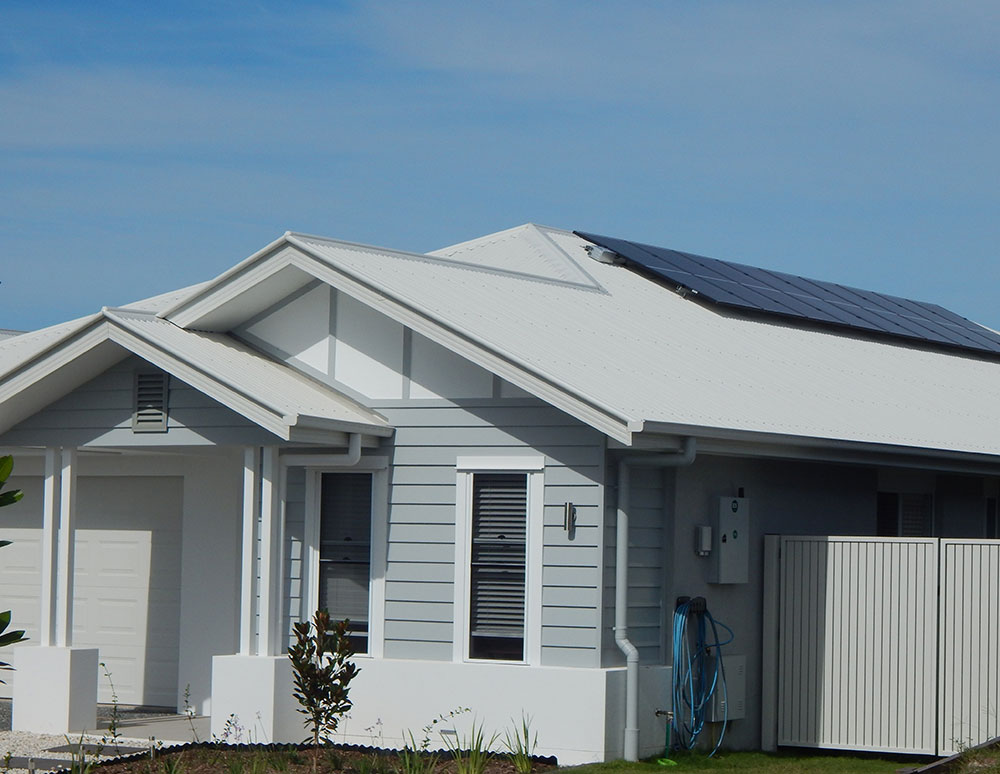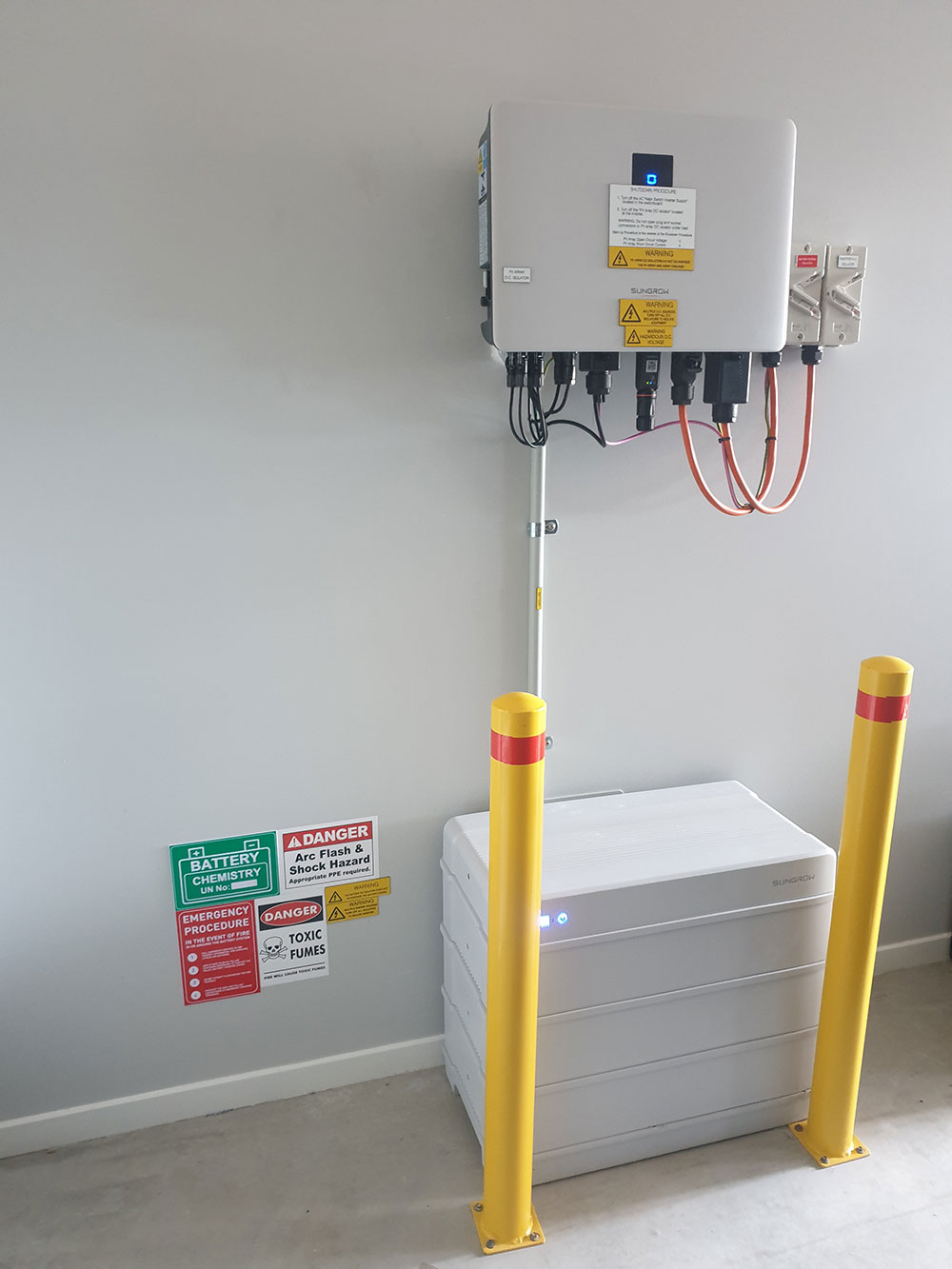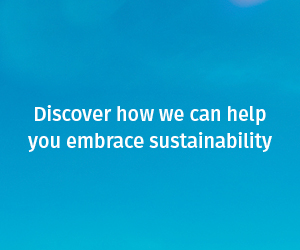How a solar home battery can benefit your home
Home batteries can ensure you have access to solar power at night or during a blackout.

One in three Queensland homes now has a solar system but unless they have a battery, solar power can only be used in real time, during the day, when the sun is out.
When a home battery is installed with a solar system, excess power generated from the panels on the roof will charge the battery.
This power can then be used at night when peak electricity prices apply or when it’s cloudy, rather than purchasing power from the grid, helping to further reduce electricity bills.
With the appropriate setup, a battery system can also provide emergency power to the home in the event of a blackout.
According to GEM Energy’s National Sales Manager David Gilles there has been a considerable uptake in Queenslanders buying home batteries in the past 12 months. The number of solar systems sold with batteries increased from five percent to about 40 percent.
“During a power outage the inverters detect the grid is down and all power is automatically supplied from the battery,” Mr Gilles said.
“Your solar panels will continue to supply power to the battery in a blackout, although it won’t export power to the grid.
“When using an emergency power supply (EPS) in a blackout, the battery will send electricity to the essential circuits, for example for lighting and some power points but this can be different for every house.
“It can also be used to keep fridges running to avoid food spoilage, as well as to charge phones so communication channels stay open in the event of a natural disaster.
“Batteries like the Tesla Powerwall 2 have the ability to back up the entire property, although this is not recommended for every home.

A Sungrow home battery.
“The number of appliances you can power during the blackout and the length of time you can do this for is dependent on the kilowatts per hour (kWh) each appliance consumes, the size of your battery and the amount of energy you had stored in your battery before the blackout.
“High load appliances like ovens and airconditioners should not be connected to an EPS, so you won’t be able to use them in a blackout.”
It’s important to talk to your solar energy consultant about what you need connected to an emergency power supply.
Mr Gilles said in the event of a flood or fire, it is recommended to shut down the solar system, however if there’s no real threat of flood or fire damage you can continue to use your solar and battery system as normal.
“If your solar panels, battery or inverter have been submerged during severe weather, contact a Clean Energy Council (CEC)-accredited electrician to get your system back up and running,” he said.
“Don’t touch electrical components in any way, including isolators until a CECaccredited electrician has inspected your system.
“If you live in a part of Queensland which can be affected by cyclones, you will also need to have a cyclone-certified solar mounting system.”
Discover how easy it is to solar-power your home
Source: Gem Energy
Related topics
Things to note
The information in this article has been prepared for general information purposes only and is not intended as legal advice or specific advice to any particular person. Any advice contained in the document is general advice, not intended as legal advice or professional advice and does not take into account any person’s particular circumstances. Before acting on anything based on this advice you should consider its appropriateness to you, having regard to your objectives and needs.
Insurance Products (excluding Travel Insurance) are issued by RACQ Insurance Limited ABN 50 009 704 152 (RACQI) and arranged by its agent, RACQ Distribution Services Pty Ltd (RDS) ABN 35 116 361 650, AFSL 567130 and RDS' authorised representatives (including RACQ Operations Pty Ltd ABN 80 009 663 414, AR No. 234978 (RACQO). Conditions, limits and exclusions apply. RDS and RACQO are in the RACQ group of companies. One of the companies in the RACQ group of companies has a minority shareholding in RACQI.
RDS and RACQO have not taken your personal objectives, circumstances or needs into account when preparing advice regarding insurance products and you will need to consider whether the advice is appropriate for you. Read the Product Disclosure Statement (PDS) and any applicable Supplementary PDS before making a purchase decision on this product. You can also access our Target Market Determinations on this website. RDS receives a commission from RACQI for the policies it arranges. RACQO receives fees paid for services it provides to RDS. Further details about remuneration are available on request prior to purchasing.
Banking and loan products issued by Members Banking Group Limited ABN 83 087 651 054 AFSL/Australian credit licence 241195 trading as RACQ Bank. Terms, conditions, fees, charges and lending policies apply. This is general advice only and may not be right for you. This information does not take your personal objectives, circumstances or needs into account. Read the disclosure documents for your selected product or service, including the Financial Services Guide and the Terms and Conditions, and consider if appropriate for you before deciding.
Except for RACQ Bank, any RACQ entity referred to on this page is not an authorised deposit-taking institution for the purposes of the Banking Act 1959 (Cth). That entity’s obligations do not represent deposits or other liabilities of RACQ Bank. RACQ Bank does not guarantee or otherwise provide assurance in respect of the obligations of that entity, unless noted otherwise.
RACQ Bank subscribes to the Customer Owned Banking Code of Practice which establishes higher standards than the law requires. The Code reflects modern consumer expectations and developments in approaches to issues such as consumer vulnerability, guarantors, and supporting customers through financial hardship. Please read our Customer Owned Banking Code of Practice page for more information.
RACQ Operations Pty Ltd (ABN 80 009 663 414 AR 000234978) and Members Travel Group Pty Ltd (ABN 45 144 538 803 AR 000432492) are acting as an Authorised Representative of the issuer of the insurance, Tokio Marine & Nichido Fire Insurance Co., Ltd. (ABN 80 000 438 291 AFSL 246 548). Any advice set out above is general in nature only, and does not take into account your objectives, financial situation or needs. Before purchasing any travel products, please consider the RACQ Travel Insurance Product Disclosure Statement (PDS) and the Target Market Determinations (TMDs) that apply to these products. Whilst the PDS outlines the Terms and Conditions of these products, the TMDs outline the intended class of customers that comprise the target market for these travel products. This will allow you to consider which products best suit your objectives, financial situation and needs and consider the products appropriateness to your personal circumstances. TMDs also outline matters involving the distribution and the review of these products. The PDS, Supplementary PDS and TMDs for each travel product can be found here.

